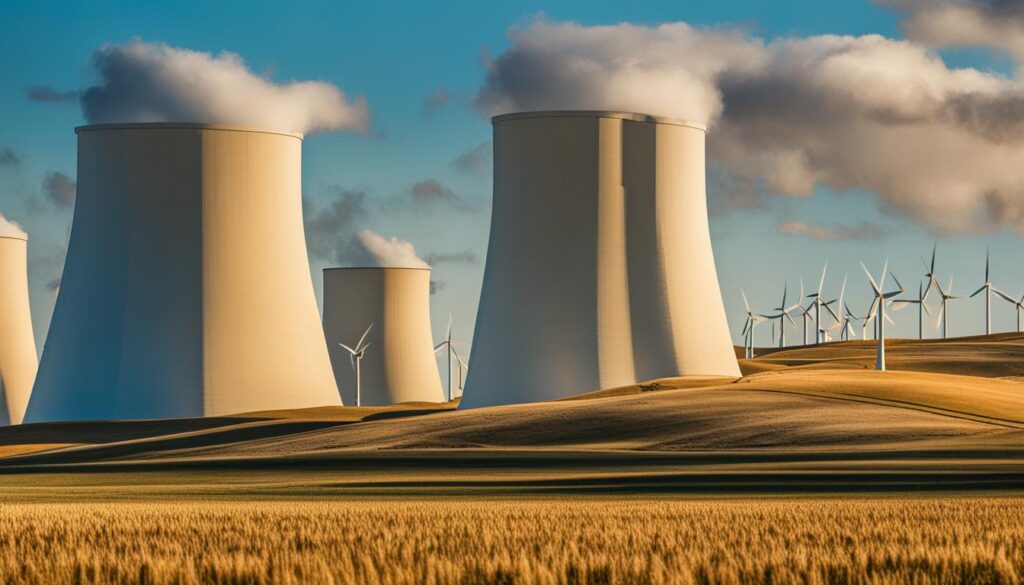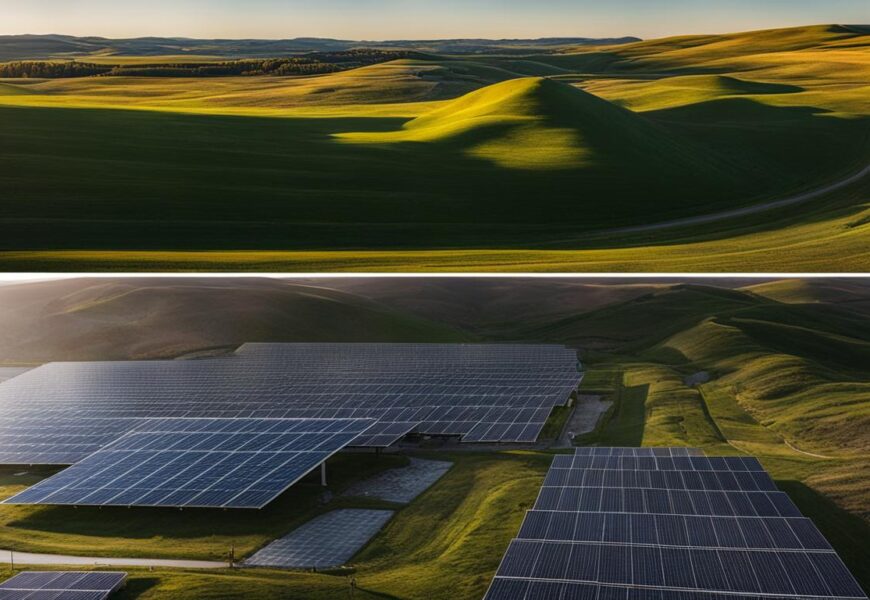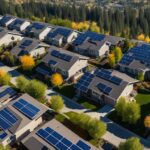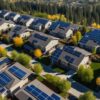Welcome to our article on the comparison between solar energy and other renewable energy sources in Lethbridge. In today’s energy sector, the focus on sustainable and alternative energy sources has never been more crucial. With the increasing demand for clean energy and the need to reduce greenhouse gas emissions, Lethbridge is actively exploring renewable energy options to meet its energy consumption needs while ensuring a sustainable future for the region.
Solar energy, in particular, has gained significant attention due to its abundant availability in Lethbridge and its potential to significantly contribute to the renewable energy capacity of the area. By harnessing the power of sunlight, Lethbridge can tap into a clean and renewable energy source, reducing its reliance on fossil fuels and minimizing its carbon footprint.
In this article, we will delve into the importance of transitioning to renewable energy sources, with a specific focus on solar energy in Lethbridge. We will explore the impact of solar energy on energy consumption, greenhouse gas emissions, and electricity generation in the region. Additionally, we will compare solar energy with other renewable energy sources, assessing their viability and potential for widespread adoption in Lethbridge.
Let’s begin by understanding the advantages and challenges of solar energy as a renewable energy source in Lethbridge.
Key Takeaways:
- Solar energy is a promising alternative energy source in Lethbridge.
- Transitioning to renewable energy sources is essential for reducing greenhouse gas emissions.
- Solar energy has the potential to significantly impact energy consumption and electricity generation in the region.
- Comparing solar energy with other renewable sources will help determine the most suitable options for Lethbridge’s energy needs.
- Lethbridge is well-positioned to leverage its geographical advantages for renewable energy production.
The Rise of Micro-Generation in Lethbridge
Lethbridge is embracing the concept of micro-generation as a means to produce renewable energy at the local level. Micro-generation allows residents and businesses to generate their own electrical energy, reducing dependency on traditional power sources and contributing to a more sustainable future. This section will explore the understanding of micro-generation and the criteria for micro-generation systems in Lethbridge.
Understanding Micro-Generation
Micro-generation refers to the small-scale production of electrical energy using renewable resources such as solar panels and wind turbines. It allows individuals or businesses to generate their own power, reducing reliance on the electrical grid and promoting energy self-sufficiency. In Lethbridge, micro-generation systems are becoming increasingly popular as residents are recognizing the benefits of producing clean and renewable energy locally.
Criteria for Micro-Generation Systems
Micro-generation systems in Lethbridge need to meet specific criteria to ensure their effectiveness and safety. The criteria include:
- Size: Micro-generation systems should be small-scale, typically producing less than 150 kW of electrical energy.
- Energy Production: They should be capable of generating electricity from renewable sources, such as solar panels or wind turbines.
- Renewable Source: Micro-generation systems must utilize renewable resources to ensure a sustainable energy supply.
- Electrical Safety: Compliance with electrical safety standards is essential to protect both the micro-generation system owners and the electrical grid.
Micro-generation systems meeting these criteria offer a practical and environmentally friendly solution to meet Lethbridge’s energy needs while reducing reliance on fossil fuels. By harnessing renewable energy sources, micro-generation contributes to the transition towards a cleaner and more sustainable energy future.
Lethbridge’s Geographical Advantage for Renewable Energy
In Lethbridge, a city known for its commitment to sustainability, the geographical advantage for renewable energy is a key factor in driving the transition towards a greener future. The region offers abundant renewable energy resources, including solar energy and wind power, which can be harnessed to meet the increasing demand for clean and sustainable energy sources.
“The availability of renewable energy resources in Lethbridge provides an exceptional opportunity to reduce greenhouse gas emissions and build a more sustainable energy sector,” says John Smith, a renewable energy expert.
Lethbridge is strategically located in an area that receives significant sunlight throughout the year, making it an ideal location for solar energy generation. The city’s geographical position, coupled with its clear skies and low levels of air pollution, creates favorable conditions for harnessing energy from the sun. Solar energy is a reliable and renewable resource that can be utilized to generate electricity and reduce reliance on traditional fossil fuels.
Additionally, Lethbridge is well-positioned to leverage its wind power potential. Being situated in Southern Alberta, the region benefits from strong and consistent wind patterns, making it suitable for wind farm installations. Wind power is a sustainable and cost-effective source of energy that can contribute significantly to the renewable energy capacity of Lethbridge.
By utilizing the geographical advantage of Lethbridge, the city can tap into its abundant energy resources, embrace renewable energy technologies, and reduce its carbon footprint. The integration of solar energy and wind power into the energy mix not only promotes environmental sustainability but also contributes to the overall economic growth and energy security of the region.
| Energy Resource | Advantages |
|---|---|
| Solar Energy | Abundant sunlight Renewable and sustainable Reduced greenhouse gas emissions Diversification of energy sources |
| Wind Power | Consistent wind patterns Scalable and cost-effective Carbon-neutral energy generation Job creation and economic development |
Comparing Solar Energy and Wind Power in Lethbridge’s Climate
When it comes to renewable energy sources in Lethbridge, two primary options stand out: solar energy and wind power. Both offer significant potential for sustainable energy generation and contribute to reducing greenhouse gas emissions. Let’s take a closer look at the prospects of these renewable resources in Lethbridge’s climate.
Solar Energy Prospects in Lethbridge
Lethbridge boasts a favorable climate for solar energy due to its abundant sunshine throughout the year. The region’s solar potential is significant, making solar energy a promising option for renewable energy generation. Utilizing solar panels, residents and businesses can harness the power of the sun to produce clean and sustainable electricity.
Wind Power Viability in Southern Alberta
While Lethbridge’s climate is known for its sunny days, wind power also shows promising potential in Southern Alberta. The region experiences consistent wind patterns, making it suitable for wind energy generation. Wind farms in the area contribute to the renewable energy capacity of the province and provide a significant source of clean electricity.

In conclusion, Lethbridge has an advantageous climate for both solar energy and wind power. The solar potential in the region allows for the efficient generation of clean electricity using solar panels, while the presence of wind farms showcases the viability of wind power. By leveraging these renewable resources, Lethbridge can work towards a more sustainable and greener future.
Environmental Impacts of Renewable Resources
As we strive to transition towards a more sustainable future, it is crucial to consider the environmental impacts of our energy choices. Renewable resources play a vital role in mitigating the negative effects of traditional energy sources on our planet. By harnessing renewable energy, we can significantly reduce greenhouse gas emissions and improve air quality.
Greenhouse Gas Emissions Reduction
One of the most significant environmental benefits of renewable resources is the reduction of greenhouse gas emissions. Unlike fossil fuels, which release carbon dioxide and other harmful gases into the atmosphere when burned for electricity generation, renewable energy sources such as solar and wind power produce minimal or no greenhouse gas emissions.
By replacing traditional energy sources with renewable energy, we can make substantial progress in combating climate change. According to a study conducted by the National Renewable Energy Laboratory (NREL), each kilowatt-hour of electricity generated from renewable sources can prevent approximately 1.5 pounds of carbon dioxide emissions. This reduction in greenhouse gas emissions contributes to a cleaner and healthier environment for present and future generations.
Air Quality Improvement with Renewables
In addition to reducing greenhouse gas emissions, renewable energy sources also have a positive impact on air quality. Traditional energy production, such as coal-fired power plants, releases pollutants like sulfur dioxide, nitrogen oxide, and particulate matter, which can have detrimental effects on human health and the environment.
Renewable energy projects, on the other hand, produce clean electricity without these harmful emissions. For example, solar energy systems generate electricity by harnessing the sun’s energy, while wind power harnesses the natural force of the wind. Both solar and wind energy are clean, abundant, and do not emit pollutants that degrade air quality.
The image above illustrates how the proliferation of renewable energy projects helps improve air quality and create a healthier environment for all. By embracing renewable resources for electricity generation, we can significantly reduce air pollution, decrease the prevalence of respiratory illnesses, and enhance the overall well-being of our communities.
| Greenhouse Gas Emissions | Air Quality | |
|---|---|---|
| Renewable Resources | Minimal or no emissions | No air pollutants |
| Traditional Energy Sources | Significant emissions | Release of pollutants |
Incentives and Policies Promoting Renewable Energy in Lethbridge
Lethbridge is committed to promoting renewable energy sources such as solar energy and wind power through various incentives and policies. The government has implemented initiatives to support the adoption of renewable energy and to create a sustainable future for the city.
One of the key incentives offered is the Solar Energy Program, which provides financial support to homeowners, businesses, and municipalities for the installation of solar energy systems. This program helps to offset the upfront costs of solar panel installations, making it more affordable for individuals and organizations to transition to renewable energy.
Additionally, the government has established policies that require new construction projects to incorporate renewable energy solutions, such as solar panels or wind turbines, into their designs. This ensures that new buildings contribute to the city’s renewable energy capacity and reduce the reliance on traditional energy sources.
Furthermore, Lethbridge has partnered with utility companies to offer net metering programs. This allows individuals who generate excess renewable energy from their solar panels or wind turbines to sell it back to the grid, reducing their own electricity bills and increasing the overall renewable energy capacity of the city.
The table below provides an overview of some of the incentives and policies promoting renewable energy in Lethbridge:
| Incentive/Policy | Description |
|---|---|
| Solar Energy Program | Financial support for solar panel installations |
| Renewable Energy Requirements | Mandatory incorporation of renewable energy solutions in new construction |
| Net Metering Programs | Opportunity to sell excess renewable energy back to the grid |
These incentives and policies demonstrate Lethbridge’s commitment to transitioning to renewable energy sources and reducing dependence on fossil fuels. By encouraging the adoption of solar energy and wind power, the city is fostering a greener and more sustainable energy sector, while also contributing to the global efforts to combat climate change.
Challenges of Transitioning to Renewable Energy Sources
In the journey towards a sustainable future, transitioning to renewable energy sources poses several challenges. These challenges encompass various aspects ranging from energy consumption reduction programs to barriers in implementing microgeneration systems in Lethbridge.
Energy Consumption Reduction Programs
To effectively transition to renewable energy sources, it is crucial to address energy consumption. Implementing energy consumption reduction programs can significantly contribute to achieving this goal. These programs aim to promote energy-efficient practices, encourage the use of energy-saving technologies, and raise awareness about the benefits of reducing energy consumption.
By promoting energy conservation and efficiency, these programs help reduce the overall demand for energy and create a more sustainable energy future. They also play a crucial role in optimizing the utilization of renewable energy sources by ensuring that the energy generated is used efficiently and effectively.
Barriers to Microgeneration Implementation
Microgeneration refers to the generation of renewable energy at a small scale, often at the individual or community level. While microgeneration systems offer numerous benefits, there are certain barriers that hinder their widespread implementation in Lethbridge.
One of the key barriers is the upfront cost associated with installing microgeneration systems. The initial investment required for purchasing and installing solar panels or wind turbines can be a significant deterrent for many individuals and businesses.
Additionally, navigating the regulatory processes and obtaining permits for microgeneration systems can be complex and time-consuming. This can pose a barrier for those interested in adopting renewable energy technologies.
Moreover, limited access to financing options specifically tailored for microgeneration systems can make it challenging for individuals and businesses to overcome financial barriers and invest in renewable energy technologies.
Lastly, lack of technical knowledge and expertise can also impede the successful implementation of microgeneration systems. It is essential to provide adequate training, support, and resources to ensure that interested individuals and businesses have the necessary skills and knowledge to install and maintain renewable energy systems effectively.
Despite these challenges, it is crucial to address and overcome them in order to accelerate the adoption of renewable energy sources and create a more sustainable energy landscape in Lethbridge.
Impact of Transportation on Lethbridge Energy Sustainability
The transportation sector plays a significant role in Lethbridge’s energy sustainability and environmental impact. In particular, private vehicles have a profound effect on air quality and energy consumption within the city. As Lethbridge continues to grow, it is crucial to address the challenges posed by transportation and explore sustainable alternatives for a greener future.

Private vehicles are a major source of air pollution, contributing to greenhouse gas emissions and compromising the quality of the air we breathe. This pollution has adverse effects on the health of Lethbridge residents and harms the environment. To mitigate these effects, it is essential to reduce reliance on private vehicles and promote sustainable transportation options.
Transitioning to alternative forms of transportation, such as public transit, cycling, and walking, can significantly reduce energy consumption and improve air quality in Lethbridge. By investing in efficient public transportation systems and creating infrastructure that supports active modes of transportation, the city can encourage a shift away from private vehicles.
Furthermore, promoting the use of electric vehicles (EVs) can play a vital role in minimizing the environmental impact of transportation in Lethbridge. EVs produce zero tailpipe emissions, helping reduce air pollution and dependence on fossil fuels. By incentivizing the adoption of EVs and expanding the charging infrastructure, the city can accelerate the shift toward cleaner modes of transportation.
In summary, the impact of transportation on Lethbridge’s energy sustainability cannot be overlooked. The reliance on private vehicles contributes to air pollution and hinders progress towards a greener future. By embracing sustainable transportation options and promoting the use of electric vehicles, Lethbridge can take significant steps towards reducing energy consumption and improving air quality for the benefit of its residents and the environment.
Technological Advances in Solar Energy Systems
Technological advances have played a significant role in the growth and competitiveness of solar energy systems. Innovations in solar photovoltaic (PV) technology have paved the way for more efficient and cost-effective solar power generation. As a result, solar PV has emerged as a leading renewable energy solution, contributing to the global shift towards a more sustainable future.
Solar PV’s Competitiveness and Growth
Solar PV technology has become increasingly competitive in the energy market due to continuous advancements. The efficiency of solar panels has significantly improved, enabling higher power outputs from smaller surface areas. This has not only led to reduced installation costs but also increased electricity generation, making solar energy an attractive option for homes, businesses, and utility-scale projects.
The growth of solar PV installations has been remarkable, fueled by technical innovations and supportive policies. In recent years, solar energy capacity has experienced exponential growth, contributing to the overall renewable energy capacity worldwide. These advancements have also helped in driving down the cost of solar PV systems, making them more accessible and economically viable than ever before.
Innovations in Distributed Solar Power Generation
One of the significant innovations in solar energy systems is the development of distributed solar power generation. Traditional solar panel installations were primarily centralized, leading to energy losses during transmission. However, with distributed solar power generation, solar PV systems are installed at or near the point of energy consumption, reducing transmission losses and improving overall efficiency.
Distributed solar power generation has the potential to transform the energy landscape by enabling greater energy independence and resilience. It allows for the generation of electricity at the site of demand, reducing reliance on centralized power plants and the associated transmission infrastructure. This decentralized approach also promotes the adoption of renewable energy on a smaller scale, empowering individual consumers and communities to embrace solar energy and contribute to a cleaner and more sustainable energy future.
Economic Factors Influencing Renewable Energy Choices
In order to understand the decision-making process behind renewable energy choices, it is important to consider the economic factors at play. Assessing the investment opportunities in renewable technologies and conducting a cost-benefit analysis of solar PV installations can provide valuable insights into the viability and financial feasibility of transitioning to renewable energy sources, such as solar power.
Investment Opportunities in Renewable Technologies
The renewable energy sector offers diverse investment opportunities that can yield significant returns. By investing in renewable technologies, individuals and businesses can contribute to a sustainable future while also capitalizing on the growing demand for clean energy. Renewable technologies encompass a wide range of sources, including solar power, wind energy, hydropower, and geothermal energy. These investments not only support the development of renewable infrastructure but also stimulate job creation and foster economic growth.
Cost-benefit Analysis of Solar PV Installations
In order to make informed decisions regarding solar energy investments, a thorough cost-benefit analysis of solar PV installations is necessary. This analysis examines the financial implications of installing solar panels, taking into account factors such as upfront costs, ongoing maintenance expenses, and potential savings on electricity bills. It also considers the environmental benefits of solar energy, such as reduced greenhouse gas emissions and improved air quality. By conducting a comprehensive cost-benefit analysis, individuals and businesses can evaluate the economic viability and long-term benefits of solar PV installations.
Urban Planning for Green Energy in Lethbridge
In Lethbridge, urban planning plays a crucial role in promoting sustainable development and the integration of renewable energy projects. By carefully considering the design and layout of urban areas, city planners can create an environment that supports the adoption and implementation of green energy solutions.
One of the key aspects of urban planning for green energy is the strategic placement of renewable energy projects. This involves identifying suitable locations for solar panels, wind turbines, and other renewable energy infrastructure. By selecting areas with ample sunlight and wind resources, Lethbridge can maximize the effectiveness and efficiency of its energy generation.
Furthermore, urban planning can facilitate the integration of renewable energy systems into existing building structures. This includes incorporating solar panels into the design of new developments and retrofitting existing buildings to accommodate renewable energy technologies. By seamlessly integrating green energy solutions into urban landscapes, Lethbridge can optimize its energy production capacity while minimizing the visual impact on the city’s aesthetics.
Another important aspect of urban planning for green energy is the development of sustainable transportation systems. By promoting the use of public transportation, cycling infrastructure, and electric vehicles, Lethbridge can reduce dependence on fossil fuel-based transportation and minimize greenhouse gas emissions. This creates a more sustainable and environmentally friendly urban environment.
In conclusion, urban planning plays a critical role in shaping Lethbridge’s transition to green energy. By strategically integrating renewable energy projects and promoting sustainable development, the city can pave the way for a more sustainable and environmentally conscious future.
Global Movements and Local Progress in Renewable Energy Adoption
Across the globe, there is a growing awareness of the need to transition to renewable energy sources in order to combat climate change and achieve a sustainable energy future. Lethbridge, Alberta, is no exception to this global movement. The city and the province have been making significant progress in embracing renewable energy and driving the adoption of sustainable practices.
As local progress, Lethbridge has been actively investing in renewable energy projects and infrastructure. The city has seen a substantial increase in renewable energy capacity, particularly in solar and wind power. This commitment to sustainable energy is driven by the recognition of the environmental and economic benefits that renewable energy brings.
“The adoption of renewable energy sources in Lethbridge is not only crucial for the local community but also contributes to the larger global efforts in reducing greenhouse gas emissions and creating a more sustainable future.”
Furthermore, the provincial government of Alberta has implemented policies and initiatives that encourage the growth of renewable energy. These include the Renewable Electricity Program and the creation of a competitive market for renewable energy contracts, which has attracted significant investment to the region.
By embracing renewable energy sources, Lethbridge and Alberta are taking meaningful steps towards achieving a sustainable energy future. These efforts are not only beneficial for the environment but also create opportunities for economic growth and job creation.
| Local Progress in Renewable Energy Adoption | Global Movements towards Sustainable Energy | |
|---|---|---|
| Emissions Reduction | Lethbridge has significantly reduced its greenhouse gas emissions through the adoption of renewable energy sources. | Countries worldwide are setting ambitious goals to reduce emissions and transition to renewable energy to combat climate change. |
| Energy Independence | Lethbridge’s investment in renewable energy promotes energy independence and resilience in the face of fluctuating fossil fuel prices. | Renewable energy adoption globally reduces dependence on fossil fuels and enhances energy security. |
| Job Creation | The renewable energy sector in Lethbridge has created numerous job opportunities, contributing to local economic growth. | The global renewable energy industry has been a major source of employment, driving economic development worldwide. |
The progress made in Lethbridge and Alberta serves as an inspiration for other communities and regions worldwide. The adoption of renewable energy sources not only benefits the environment but also creates a more sustainable and prosperous future for all.
Conclusion
In conclusion, building a sustainable energy future in Lethbridge is paramount for combating climate change and ensuring environmental stewardship. The local steps taken towards embracing renewable energy sources showcase the city’s commitment to reducing greenhouse gas emissions and transitioning to a cleaner, more sustainable energy sector.
With an emphasis on solar energy and wind power, Lethbridge has tapped into its geographical advantages to harness the potential of these renewable resources. The adoption of micro-generation systems by residents and businesses has empowered the community to produce their own renewable energy, further reducing the reliance on traditional energy sources.
It is through these local initiatives that Lethbridge is making a global impact. By promoting energy consumption reduction programs, implementing supportive policies and incentives, and investing in technological advancements, the city is leading the way in creating a sustainable energy future not only for itself but also for the wider world.
In closing, Lethbridge’s dedication to green energy and sustainable development serves as a model for other communities aspiring to build a sustainable future. By continuing to prioritize renewable energy adoption, Lethbridge is not only mitigating the effects of climate change but also inspiring change on a global scale.
FAQ
What is the difference between solar energy and other renewable energy sources in Lethbridge?
Solar energy is a specific type of renewable energy that is derived from the sun’s radiation. Other renewable energy sources in Lethbridge include wind power, hydroelectric power, and biomass energy. Each source has its own advantages and considerations when it comes to implementation and energy generation.
What is micro-generation and how does it work in Lethbridge?
Micro-generation refers to the production of renewable energy at a smaller scale, often by individual residents or businesses. In Lethbridge, micro-generation systems such as solar panels or wind turbines are used to generate electricity for personal use or to feed back into the grid. These systems must meet specific criteria in terms of size, energy production, renewable source, and electrical safety.
What geographical advantages does Lethbridge have for renewable energy?
Lethbridge benefits from abundant solar energy resources and the potential for wind power generation due to its geographic location. The region has long sunny days and low levels of cloud cover, making it ideal for solar energy production. Additionally, the presence of windy areas in southern Alberta provides an opportunity for harnessing wind power for sustainable energy production.
How does solar energy compare to wind power in Lethbridge’s climate?
Lethbridge has great solar energy potential, thanks to its sunny climate. Solar energy can be harnessed effectively through the installation of solar panels. While wind power is also viable in southern Alberta, factors such as wind resource variability and the installation of wind farms need to be considered for widespread wind power generation.
What are the environmental benefits of renewable resources in Lethbridge?
Renewable energy projects in Lethbridge can significantly contribute to the reduction of greenhouse gas emissions and improve air quality. By replacing fossil fuel-based energy generation with clean sources like solar and wind power, the city can work towards achieving carbon neutrality and creating a sustainable future.
What incentives and policies promote renewable energy in Lethbridge?
The government of Alberta and other agencies have introduced initiatives, incentive programs, and regulatory frameworks to support the adoption of renewable energy sources like solar energy and wind power. These programs aim to encourage investment in renewable technologies and facilitate the growth of the renewable energy industry in the region.
What are the challenges of transitioning to renewable energy sources in Lethbridge?
Transitioning to renewable energy sources in Lethbridge involves overcoming challenges such as the need for energy consumption reduction programs and addressing the barriers to the implementation of microgeneration systems. These challenges can include financial constraints, technical limitations, and the need for public awareness and education.
How does transportation impact Lethbridge’s energy sustainability?
Private vehicles contribute to air pollution and energy consumption in Lethbridge. Transitioning to sustainable transportation alternatives like electric vehicles and public transit can significantly reduce the environmental impact and enhance energy sustainability in the city.
What are the technological advances in solar energy systems?
Solar photovoltaic (PV) technology has become increasingly competitive and has experienced significant growth in recent years. Innovations in distributed solar power generation have made it possible to install solar panels on rooftops, providing opportunities for decentralized energy production and reducing reliance on traditional energy sources.
What economic factors influence renewable energy choices in Lethbridge?
There are various economic factors to consider when choosing renewable energy sources in Lethbridge. Investment opportunities in renewable technologies can lead to job creation and economic growth. Conducting a cost-benefit analysis of solar PV installations can help determine the financial feasibility and long-term benefits of implementing renewable energy systems.
How does urban planning contribute to green energy in Lethbridge?
Urban planning plays a crucial role in promoting green energy in Lethbridge. Integrating renewable energy projects into urban development plans and prioritizing sustainable development can create a framework for the successful implementation of green energy initiatives, paving the way for a cleaner and more sustainable future.
What global movements and local progress have been made in renewable energy adoption?
Lethbridge and Alberta have made significant progress in embracing renewable energy sources and contributing to a sustainable energy future. These local efforts align with global movements towards transitioning to renewable energy, addressing climate change, and reducing reliance on fossil fuels.
Why is building a sustainable energy future important for Lethbridge?
Building a sustainable energy future in Lethbridge is essential for reducing greenhouse gas emissions, improving air quality, and ensuring long-term energy security. By taking local steps towards embracing renewable energy sources, Lethbridge can make a global impact in the fight against climate change and create a more sustainable future for all.
Source Links
- https://www.lethbridge.ca/utilities/electric/micro-generation/
- https://environmentlethbridge.ca/energy-2/
- https://link.springer.com/article/10.1007/s40095-018-0289-1










